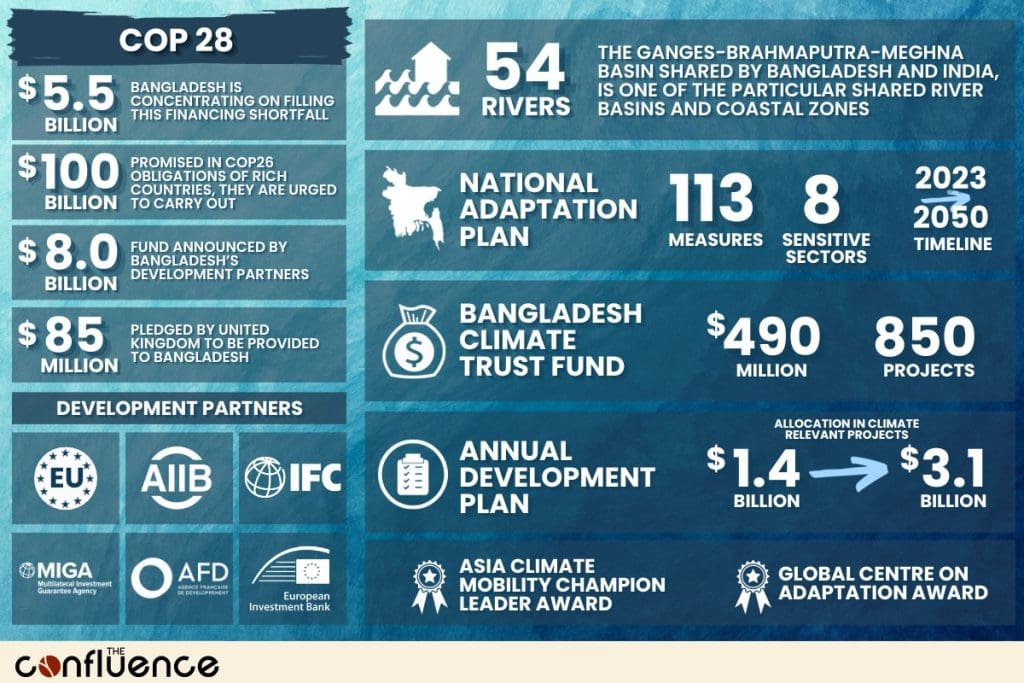With the establishment of Loss and Damage Fund, COP 28 has opened up new horizon of hope in climate finance for Bangladesh.
Bangladesh is facing several climate-related challenges, including dry seasons, cyclones, floods, severe weather, and rising sea levels. The nation’s terrain makes it particularly vulnerable to natural disasters, and the long-term impacts of climate change pose a major threat to millions of people who live along the nation’s vulnerable coastline. Bangladesh is also at risk of uprooting, with up to 13.3 million people expected to be relocated by 2050 due to climate change.
0
M
Bangladeshis to be relocated within 2025
Bangladesh is proactively tackling these issues by advocating for greater climate finance delivery, applying pressure on developed countries to add new and additional funds to the fund, operationalizing the Loss and Damage mechanism, and endorsing evidence-based treatments, sustainable farming practices, and a global climate insurance programme. In its capacity as the chair of the Climate Vulnerable Forum, Bangladesh is also advocating for stronger NDCs or contributions to the Paris Agreement, citing 2020 as a “deadline for survival” to ensure that the agreement’s 1.5 degrees Celsius target is upheld and that advancement towards the Sustainable Development Goals is suitably protected.

The United Nations Climate Change Conference, or COP 28, has taken place in Dubai, United Arab Emirates, from November 30 to December 12, 2023. It is expected that Bangladesh would continue to work towards stronger climate fund delivery, stricter emission reduction targets, a stronger emphasis on the development of climate-resilient infrastructure, and more regional collaboration on climate-related issues as per the decisions taken at the COP28. Bangladesh’s participation at COP28 is anticipated to provide a number of results.
Loss and Damage Fund
0
Bn
Financing Shortfall
In order to carry out its National Adaptation Plan (NAP) and other climate resilience projects, Bangladesh concentrated on filling the $5.5 billion financing shortfall at COP28. Initiatives for climate resilience and adaptation in the nation have benefited greatly from money provided by the Bangladesh Climate Change Trust Fund (BCCTF), but critical interventions are hampered by a financial shortfall.
$
0
Bn
Pledged by the development partners
Bangladesh urged rich nations to carry out their COP 26 obligations, which include providing the promised $100 billion annually and tripling adaptation funding by 2025, with a request for further funding beyond 2025. Bangladesh is collaborating with a number of development partners, such as the European Union, the Asian Infrastructure Investment Bank (AIIB), the World Bank, the International Finance Corporation (IFC), the Multilateral Investment Guarantee Agency (MIGA), the Agence Française de Développement (AFD), and the European Investment Bank (EIB), to close this gap. With the goal of assisting Bangladesh in reducing the effects of climate change and preparing for it, these development partners have announced a $8 billion fund. The Bangladesh Climate and Development Platform is funded by the International Monetary Fund as part of this cooperative strategy to maximise investments in adaptation and mitigation.
Partnership with the UK
In order to collaborate with Bangladesh at COP28, the UK is also cooperating with Bangladesh. Through policy discussion, knowledge exchange, and opportunity leveraging, the two countries want to combat climate change, perhaps by resolving the financing gap and advancing sustainable development. Bangladesh and other vulnerable areas that are severely impacted by the effects of climate change are anticipated to get financial help from the Loss and Damage Fund, which was established during COP28. Bangladesh, one of the countries most at risk from climate change, is requesting assistance from this fund in order to deal with the growing loss and harm brought on by rising sea levels, intense heat waves, and crop failures.
£
0
Mn
The UK’s pledge
Bangladesh and the UK have decided to collaborate during COP28, exchanging knowledge, exploring policy options, and taking advantage of possibilities to combat climate change. Beyond COP28, they intend to maintain and grow their climate cooperation by fostering ties between academic institutions and providing assistance to young climate activists. At COP28, the UK pledged to provide more than £85 million in financing to combat deforestation, reduce methane emissions, and establish a partnership with Brazil to do so.
The UK and Bangladesh is supposed to work on some specific areas
Policy Dialogues
In order to address climate change challenges and exchange best practices for doing so while advancing sustainable development, the UK and Bangladesh will have policy talks.
Sharing Skills
To combat climate change and advance sustainable development, the two nations will pool their respective skills. This involves sharing expertise on renewable energy, climate resilience, and other climate-related subjects.
Leveraging Possibilities
Bangladesh and the UK will collaborate to take advantage of climate action possibilities, including encouraging the use of renewable energy sources and alleviating loss and damage brought on by climate change.
Assisting Vulnerable Communities
Bangladeshi Prime Minister Sheikh Hasina and COP28 President-Designate have demanded that the world’s most vulnerable populations be at the centre of climate action, stressing the need of putting people’s lives and livelihoods first.
Building Bridges across Academic Institutions
The UK and Bangladesh will collaborate to build bridges across academic institutions in both countries and encourage more young climate activists to participate in policy making.
Collaboration with the Private Sector
The UK and Bangladesh will concentrate on the role of the private sector in addressing climate change. The UK’s top priority is to make sure that COP28 produces a result that keeps the world on track to meet the 1.5°C target, advances the transition from fossil fuels to clean energy, and restores public confidence in climate finance pledges.
The UK funds intend to help nations like Bangladesh deal with the consequences of extreme weather events, the loss of agricultural land, and the costs associated with internal migration as a result of climate change. The fund is also meant to assist national efforts to minimise the effects of climate change and to help communities recover from climate-related disasters. Bangladesh is pushing for the establishment of the Loss and Damage Fund and is anticipated to maintain its prominent position in promoting the increased delivery of climate financing, particularly by pressuring wealthy nations to contribute fresh and extra funds to the Fund.
Regional Cooperation
The Ganges-Brahmaputra-Meghna (GBM) basin, which comprises 54 rivers shared by Bangladesh and India, is one of the particular shared river basins and coastal zones on which Bangladesh is working with neighbouring nations at COP28. In order to mitigate the negative effects of climate change and promote collaboration between the two nations, this transboundary water cooperation is essential.
In order to combat the effects of climate change, Bangladesh is also concentrating on preserving its low-lying coastal areas, strengthening riverbanks, and developing resilient infrastructure and transportation systems. In addition, the nation is highlighting how crucial it is for all segments of society to get involved in the fight against climate change and support sustainable development.
Financing the Climate Projects
Bangladesh is planning to finance its climate projects at COP28 through various initiatives and partnerships. Some of the key strategies are international cooperation and some are domestic initiatives.
National Adaptation Plan (NAP) Implementation
0
Measures in Eight Sectors
Bangladesh’s National Adaptation Plan (NAP), which outlines 113 measures for eight sensitive sectors from 2023 to 2050, was presented to the UNFCCC. The nation is looking for financial assistance to carry out the NAP since there is a $5.5 billion financing shortfall that prevents important measures. The NAP seeks to accomplish six distinct objectives:
Ensuring defence against calamities and climate change
Creating Agriculture Resistant to Climate Change
Constructing climate-smart urban areas
Preserving nature for adaptability
Including flexibility in your plans
Ensuring the development of ability and inventiveness in adaptation
$
0
Bn
Needed for 113 initiatives
Eleven climate-stressed regions in Bangladesh will see the implementation of 113 significant initiatives, as outlined by the NAP. These interventions will need more than BDT 20 trillion, or over USD 230 billion; nearly three-quarters of this sum will be required by 2040. The five-year development plans of Bangladesh dictate that the NAP be reviewed every five years.
Bangladesh Climate Change Trust Fund
$
0
Mn
Committed for BCCTF
The “Bangladesh Climate Change Trust Fund,” which was formed by Bangladesh, has $490 million committed for more than 850 projects. The country’s efforts to finance climate resilience and adaptation have benefited greatly from this fund, and Bangladesh’s larger attempts to combat climate change and advance sustainable development are in line with the BCCTF’s engagement with COP28.
$
0
Mn
Development Partners’ Contribution
Initiatives across the nation to finance climate resilience and adaptation have benefited greatly from this fund. The Green Climate Fund (GCF), the International Finance Corporation (IFC), the Multilateral Investment Guarantee Agency (MIGA), the Asian Infrastructure Investment Bank (AIIB), the Agence Française de Développement (AFD), the EU, the European Investment Bank (EIB), and other development partners are also providing funding to Bangladesh for nine private-sector climate projects, totaling $441.2 million. Additionally, the nation is working to close a $5.5 billion financing deficit so that its National Adaptation Plan (NAP) may be implemented between 2023 and 2050. Additional money from budget prioritisation, carbon taxes, outside funding, and private investment can help close the finance gap.
2.5x Increase in Climate-Relevant Expenditure in ADP
From USD 1.4 billion to over USD 3.1 billion
Aside from this, over the last eight years, the amount of money allocated to climate-relevant projects in the Annual Development Plan has increased by 2.5 times, from USD 1.4 billion to over USD 3.1 billion. These projects include building embankments, cyclone shelters, stress-tolerant crop varieties, and coastal afforestation and reforestation. The Bangladesh Climate and Development Platform was established by Bangladesh and its allies to maximise investments in mitigation and adaptation. This platform seeks to expedite national investments in resilience and climate adaption.
Awards Received by Bangladesh for Climate Protection
Global Center on Adaptation Award for Local Climate Leadership
In the Innovation in Developing Finance category, Bangladesh became victorious in the Global Centre on Adaptation (GCA) Locally Led Adaptation (LLA) championship Award. The award honours Bangladesh’s creative strategy for raising capital for projects aimed at promoting climate resilience and adaptations.
This award highlights innovative, commendable, and scalable locally-led projects addressing the effects of climate change, with a focus on assisting vulnerable groups and populations dealing with urgent environmental issues. It also recognises Bangladesh’s outstanding contributions to local adaptation and resilience. The purpose of the award is to honour the recipients’ accomplishments and to draw attention to the creativity and teamwork that are crucial to a sustainable future.
Global Center on Adaptation Award for Local Climate Leadership
In recognition of her leadership in promoting climate initiatives, Prime Minister Sheikh Hasina received the Asia Climate Mobility Champion Leader Award at COP28. With assistance from the UN system and the International Organisation for Migration (IOM), the Global Centre for Climate Mobility presented the prize. The Prime Minister Sheikh Hasina and the nation’s persistent efforts to address climate change and the associated concerns have received international attention with this award. The Global Centre for Climate Mobility strives to provide regional intergovernmental organisations and development finance institutions with comprehensive and cooperative solutions.
The Local Government Division, with collaboration from the European Union, Sweden, Denmark, United Nations Capital Development Fund (UNCDF), and United Nations Development Programme (UNDP), jointly implemented the Local Government Initiative on Climate Change (LoGIC), has awarded Bangladesh for its initiatives. Financing for climate resilience and adaptation projects is developed through the LoGIC programme.
About the Author

A R Tahseen Jahan is the Co-Founder and Head of Policy at The Confluence. An undergrad student of Development Studies at the University of Dhaka, she worked on topics of economic development and public policy analysis.